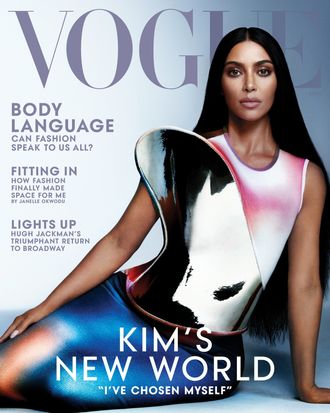
“I’ve Chosen Myself,” reads the cover of Vogue’s March 2022 issue. Kim Kardashian West is in a form-fitting Loewe dress with long, straight black hair — and a noticeably darker complexion. The photograph almost immediately sparked backlash from Twitter users who pointed out that the image — its tone and styling — closely mirrors photographs of Black women over the years such as Nina Simone, Naomi Campbell, and Alicia Keys. The choice Kardashian West is making here is indeed about her, and it’s one she’s made before and often: a white woman who gets to choose when and how she misappropriates Blackness (through the altering of her image).
Wanna Thompson, a journalist who is credited with coining the term Blackfishing, explained to CNN, “Blackfishing is when white public figures or influencers do everything in their power to appear Black, whether that means to tan their skin excessively in an attempt to achieve ambiguity and wear hairstyles and clothing trends that have been pioneered by Black women.”
Does this fit the bill? In one image, Kardashian is wearing oversize gold Schiaparelli earrings with her hair in a braided updo, another aesthetic reminiscent of portraits of famous Black women. Zara Rahim tweeted the photo along with a collage of pictures of Black women, writing, “Pinterest reverse search usually tells you a good amount about you need to know,” noting the similarities. In another photo, Kardashian West’s wearing a Balenciaga bodysuit, gloves, and an updo in a look similar to images taken of Beyoncé.
This isn’t the first time Kardashian West has come under fire for her appearance. In 2017, when promoting her KKW Beauty line, she posted an image of herself with darker skin and was called out for using blackface. “I would obviously never want to offend anyone,” Kardashian told the New York Times in response. She went on to say, “Of course, I have the utmost respect for why people might feel the way they did. But we made the necessary changes to that photo and the rest of the photos. We saw the problem, and we adapted and changed right away. Definitely I have learned from it.” That was five years ago.
In a December interview with i-D magazine, Kardashian West was asked about the criticisms she’s received for Blackfishing, to which she responded, “Obviously, I would never do anything to appropriate any culture. But I have in the past got backlash from putting my hair in braids, and I understand that.” In 2016, the star donned cornrows and inaccurately referred to them as “boxer braids,” and in 2018, she called her cornrows “Bo Derek braids.”
It’s disheartening to continually see white women capitalize on Blackness by manufacturing an aesthetic that can be applied and discarded. People are quick to call many parts of the Black-woman aesthetic and style “trends” to be followed. Other examples include cornrows and braids being used to protect our gravity-defying strands of hair as well as the natural curves of our bodies, which were horrifically objectified during slavery and throughout history (Sarah Baartman spent years on display in European “freak shows” with the size of her butt being a main attraction).
Then there’s our skin. I understand that tans are a thing, but there’s a line between a tan and blackface. And too many white women, Kardashian West included, carelessly cross it. Black skin is not a trend. To treat it as such is to minimize our lived experiences. To put the image of a white woman with darkened skin and African-inspired imagery on the cover of a globally respected fashion magazine is wildly problematic. And to share those images during Black History Month — no words.




